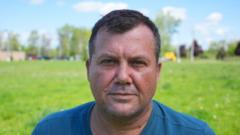In an exclusive interview, Charl Kleinhaus, a South African farmer recently granted refugee status in the US, defends his escape from alleged discrimination and violence back home. Amid contrasting views on his situation, he expresses gratitude towards former President Trump’s policies while acknowledging criticisms from some of his compatriots.
South African Farmer Defends US Refugee Status Amid Controversy

South African Farmer Defends US Refugee Status Amid Controversy
Charl Kleinhaus discusses his refugee status in the US and the discrimination he claims to have faced in South Africa.
Last week, Charl Kleinhaus found himself transitioning from a picturesque farm in Mpumalanga, South Africa, to a budget hotel near a busy highway in the US. At 46, Kleinhaus and fellow white South Africans were relocated to the United States under a controversial policy initiated by former President Donald Trump to protect them from claimed discrimination in their homeland—a claim that the South African government has rejected.
Reflecting on his difficult decision to leave, Kleinhaus remarks, “I didn't come here for fun,” explaining that he received multiple death threats via WhatsApp. He recounts how he left behind his home and possessions, including his vehicles and pets, due to fears for his family's safety. His sentiment of relief contrasts sharply with his previous life: “My children are safe,” he shares, revealing that he had lost his wife in a tragic accident years prior.
The status of white South African farmers has become a prominent discussion topic among right-wing circles in the US, with figures like Trump and billionaire Elon Musk alleging a “genocide” against them—a declaration that experts have widely discredited. In a bold move earlier this year, Trump signed an executive order empowering some Afrikaners, such as Kleinhaus, with refugee status amid claims of persecution.
Kleinhaus expressed surprise at the quick processing of his application, feeling as though someone was finally acknowledging the challenges he faced. His arrival in the US was marked by a festive reception, which he described as overwhelming.
Despite enjoying a newfound safety, Kleinhaus points out the struggle faced by other communities in South Africa, acknowledging the slow changes in land ownership post-apartheid. He highlights concerns regarding government policies that allow land expropriation without compensation, calling the current situation on his property untenable.
Reactions to the resettlement include skepticism from some fellow Afrikaners who accuse him and others of opportunism, arguing that being a victim of crime does not equate to deserving refugee status. Kleinhaus, however, stands firm, referencing specific threats he has received and incidents of violence within his community.
South African President Cyril Ramaphosa labeled the émigrés as "cowards" for leaving rather than confronting local issues. He stressed that as resilient South Africans, they should stay and tackle their problems, a sentiment Kleinhaus and his group challenge.
Adding to the complexity of Kleinhaus’s case are recent allegations concerning problematic social media posts he made, which have been scrutinized for antisemitic content. In addressing these allegations, he clarifies that his comments were isolated and stemmed from a moment of anger.
Critically, the vetting procedures for refugees like Kleinhaus have sparked debate in the US, especially given the Trump administration's removal of many other refugees. Despite the uncertainties and potential backlash, Kleinhaus remains hopeful and asserts, “We come here to make a contribution to the country.”
As he navigates this new chapter, Kleinhaus's faith underscores his journey: “My life is in God’s hands,” he states, reflecting on his belief that this relocation is part of a larger divine plan.





















